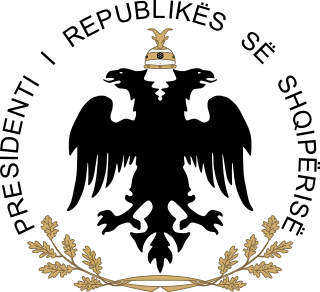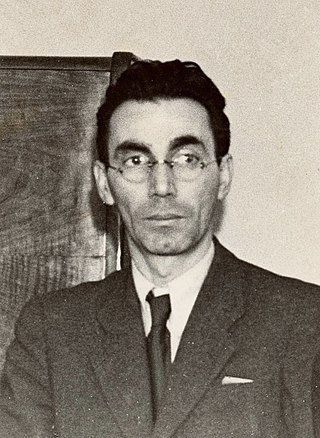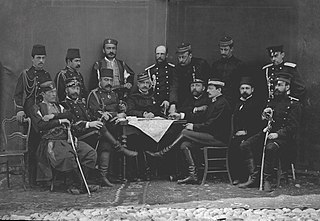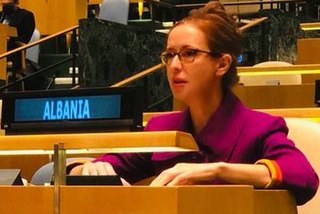
Uganda has formal diplomatic relations with many countries, some accredited. Since the colonial era and after independence Uganda has grown to be one of the most important African countries. Uganda has diplomatic relations with many countries throughout Africa, the Americas, Asia, Europe and Oceania. Uganda is a member of the United Nations and the Commonwealth of Nations since 1962.

Zog I was the leader of Albania from 1922 to 1939. At age 27, he first served as Albania's youngest ever Prime Minister (1922–1924), then as president (1925–1928), and finally as king (1928–1939).

The president of Albania, officially styled the President of the Republic of Albania, is the head of state, commander-in-chief of the military and the representative of the unity of the Albanian people.

Robert Sanderson McCormick was an American diplomat. Born in rural Virginia, he was part of the extended McCormick family that became influential in Chicago.

The Principality of Albania was a short-lived monarchy in Albania, headed by Wilhelm, Prince of Albania, that lasted from the Treaty of London of 1913 which ended the First Balkan War, through the invasions of Albania during World War I and the subsequent disputes over Albanian independence during the Paris Peace Conference of 1919, until 1925, when the monarchy was abolished and the Albanian Republic declared.

The Ministry for Europe and Foreign Affairs is a department of the Albanian Government, in charge of diplomacy, foreign policy and the process of admission of Albania into the European Union. The ministry also provides support to Albanian citizens residing abroad. In September 2017, the ministry was restructured and it was merged with the Ministry of European Integration.

Xhafer Deva was a fascist Kosovo Albanian politician during World War II. A notable local politician in Kosovo and in Axis-occupied Albania, he took charge of German-occupied Mitrovica and worked with the Germans to establish a pro-German Albanian government in Kosovo. Following the capitulation of Italy from the war, he helped form a provisional government under German occupation and set up the Second League of Prizren alongside other Albanian nationalists.
Albert Ghica (1868-1928) was a Romanian writer and socialite. He was a member of the Ghica noble family. Later in life he changed his name to the Albanian form Gjika, for more credentials in his quest for the Albanian throne.

General Freddy José Padilla de León is a retired General of the Army of Colombia and currently serves as Ambassador of Colombia to Austria and Permanent Representative to the United Nations Office at Vienna. Prior to this diplomatic post General Padilla served as the General Commander of the Armed Forces of Colombia from 2006 to 2010, and as such assumed the Ministry of National Defence ad interim in 2009.

In World War I, Albania had been an independent state, having gained independence from the Ottoman Empire on 28 November 1912, during the First Balkan War. It was recognised by the Great Powers as the Principality of Albania, after Turkey officially renounced all its rights in May 1913. Being a fledgling new country, it quickly unravelled and just a few months after taking power, its German ruler, Prince Wilhelm, was forced to flee. After World War I broke out, anarchy took hold of the country as tribes and regions rebelled against central rule. To protect the Greek minority, Greek control was established in the southern districts replacing the Northern Epirote units beginning in October 1914. In response to this, Italy, although officially neutral at the time, also sent troops into the port of Vlorë, while Serbia and Montenegro took control of northern regions. In 1915 Serbia was overrun by combined German, Austro-Hungarian, and Bulgarian forces; the Serbian army retreated across the mountain passes of northern Albania, towards the Adriatic. Italian troops drove the Greeks from southern Albania and brought almost all Albanian territory under their control. Austrian forces invaded in June 1916; Austro-Hungarian forces remained in Albania until the end of the war when a multinational Allied force broke through and pushed them out in 1918.

The International Commission of Control was the commission established on October 15, 1913, on the basis of the decision by the six Great Powers made on July 29, 1913, according to the London Treaty signed on May 30, 1913. Its goal was to take care of the administration of newly established Albania until its own political institutions were in order.

The All-Albanian Congress was a held in Vlorë on November 28, 1912. Congress participants constituted the Assembly of Vlorë which established Albanian Provisional Government and elected Ismail Kemal as its president.

The Malissori uprising or the Albanian revolt of 1911 was one of many Albanian revolts in the Ottoman Empire and lasted from 24 March 1911 until 4 August 1911 in the region of Malësia.

Independent Albania was a parliamentary state declared in Vlorë on 28 November 1912 during the First Balkan War. Its assembly was constituted on the same day while its government and senate were established on 5 December 1912.
The People's Socialist Republic of Albania joined the United Nations on 14 December 1955, and has participated in several UN peacekeeping operations. The current Representative of Albania in the UN is Mr. Ferit Hoxha. Albania is a non-permanent member of the 15-country UN Security Council for the two-year term (2022–2023).

Besiana Kadare is an Albanian diplomat. She served as the Ambassador Extraordinary and Plenipotentiary Permanent Representative of Albania to the United Nations, a vice president of the United Nations General Assembly for its 75th session, and Albania's ambassador to Cuba. Albania sat on the UN Security Council for a two-year term, 2022–23. She was formerly from 2011 to 2016 Albania's Ambassador Extraordinary and Plenipotentiary and Permanent Delegate to the United Nations Educational, Scientific and Cultural Organization (UNESCO) in Paris. She is the daughter of writers Helena Kadare and Ismail Kadare.
The Duchy of Parma and the United States mutually recognized each other in 1850 with formal relations established in 1853. Diplomatic relations ceased in 1860 when the Duchy was incorporated into Kingdom of Sardinia then into the Kingdom of Italy the following year in 1861.














